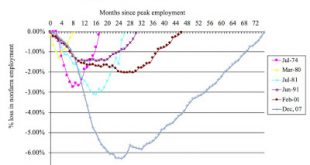Michael Stephens | August 15, 2018 The job guarantee proposal fleshed out and analyzed by L. Randall Wray, Flavia Dantas, Scott Fullwiler, Pavlina Tcherneva, and Stephanie Kelton — dubbed the Public Service Employment (PSE) program — garnered a considerable amount of media attention as support for some version of a job guarantee began appearing on the agendas of various 2020 Democratic hopefuls. This panel discussion at the...
Read More »Lawrence Mishel — Social Security data confirm same old pattern: Self-employment headcount has risen but economic impact remains small
One indication of the growth of self-employment activity has been the rise in the number of people filing Schedule C income and self-employment earnings in their annual tax filings. This growth has been cited to illustrate the escalation of self-employment and to suggest that Bureau of Labor Statistics (BLS) measures of self-employment are missing an important phenomenon. Tracking headcounts of tax filings, however, does not adequately reflect trends in the economic impact of...
Read More »Joshua Bateman — Why China is spending billions to develop an army of robots to turbocharge its economy
Chinese President Xi Jinping has called for a robot revolution in manufacturing to boost productivity. Wages in China are rising, and it's becoming harder to compete with cheap labor. An aging population in China also necessitates automation. The working-age population, people age 15 to 64, could drop to 800 million by 2050 from 998 million today. Chinese robotic growth is forecast to exceed 20 percent annually through 2020. Interesting article to read in full. China's socialist ideology...
Read More »A very British disease
The desire to judge people's motives rather than addressing their needs is a “British disease”. We have been suffering from it for hundreds of years, cycling endlessly through repeated cycles of generosity and harshness. Each cycle ends in public outrage and an abrupt reversal: but the memory eventually fades, and the disease reappears in a new form. In this post, I outline the tragic history of Britain's repeated attempts to "categorise the poor". For centuries, successive British...
Read More »The Job Guarantee and the Economics of Fear: A Response to Robert Samuelson
The Job Guarantee is finally getting the public debate it deserves and criticism is expected. Building on several decades of research, the Levy Institute’s latest proposal analyzes the program’s economic impact and advances a blueprint for its implementation. Critics have taken note and are (thus far) restating the usual concerns, but with a notably alarmist tone. The latest, courtesy of the Washington Post’s Robert Samuelson, warns that the Job Guarantee would be 1) an expensive...
Read More »On the Costs of Doing Without a Job Guarantee
Michael Stephens | May 1, 2018 Pavlina Tcherneva — who, along with L. Randall Wray, Flavia Dantas, Scott Fullwiler, and Stephanie Kelton, authored this report estimating the economic impact of a job guarantee proposal (the Public Service Employment program) — was interviewed by Bloomberg’s Joe Weisenthal and Julia Chatterley about the purposes and costs of the plan. This recently released policy note by L. Randall Wray also...
Read More »The Bank of England should not raise rates: here’s why
This week a friend casually explained that he and his wife considered having a second child. But having recently moved into a new house, they were having to fork out a large share of their income on mortgage interest payments. Hearing talk of potential rate rises had therefore persuaded them not to risk another pregnancy.Such are the life-changing impacts of decisions (or non-decisions) made by a group of men (and one woman) on the Monetary Policy Committee (MPC) of the Bank...
Read More »Giving priority to “purposeful and dignified work” for all – but how?
Ann Pettifor reviews The Everyday Economy by Rachel Reeves MP.“For if truth be at all within the reach of human capacity, ’tis certain it must lie very deep and abstruse…and to hope we shall arrive at it without pains, while the greatest geniuses have failed with the utmost pains, must certainly be esteemed sufficiently vain and presumptuous.” - David Hume, A Treatise of Human Nature.At the launch last week of The Everyday Economy Rachel Reeves MP introduced her new short...
Read More »Employment losses in historical perspective
My colleague Chris Magee sent this graphs around about employment losses during different recessions. The first one below show all the recession from the 1970s onwards. The next one, which I modified to show just the Great Recession and the Great Depression, is below, and gives a sense of the dimension of the Depression. The sheer size of the Depression is impressive. Even though the last recession is an outlier, it pales in comparison with the Great Depression. You can see in the graph...
Read More »Gaius Publius — Stephen Hawking on What Killed the World of the Jetsons. Prelude to Thoughts on a Guaranteed Jobs Program
I’m about to start writing about the new proposal from Stephanie Kelton and her colleagues at the Levy Institute on the guaranteed jobs program, a proposal, by the way, that’s starting to get some serious notice. But ahead of that work I want to consider an extreme case, but not an unlikely one. What if, in the future, there simply aren’t enough jobs for everyone? What then? Put more simply, what’s the underlying assumption behind the world of the Jetsons? The late Stephen Hawking, in his...
Read More » Heterodox
Heterodox


